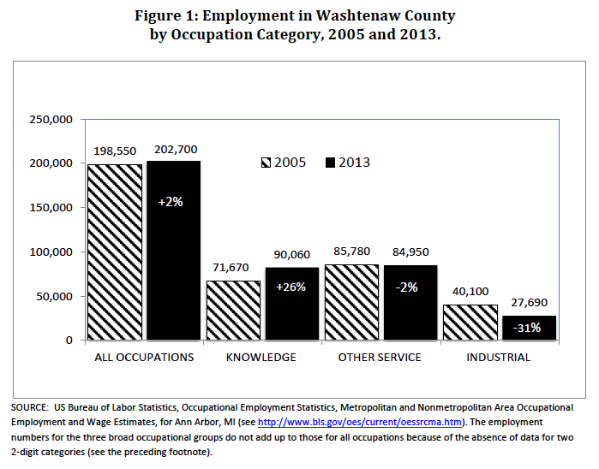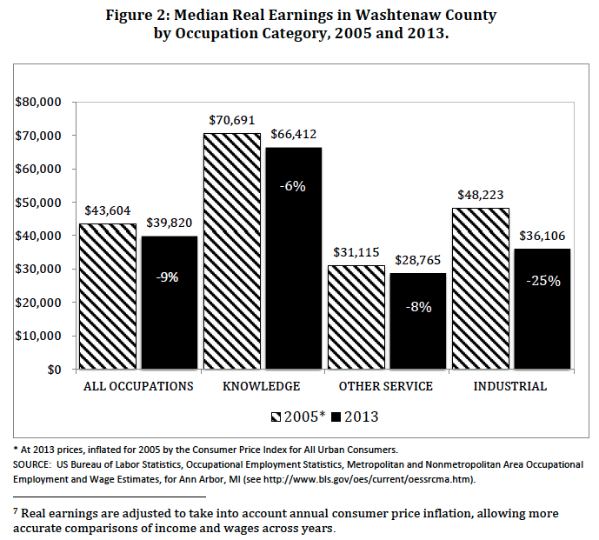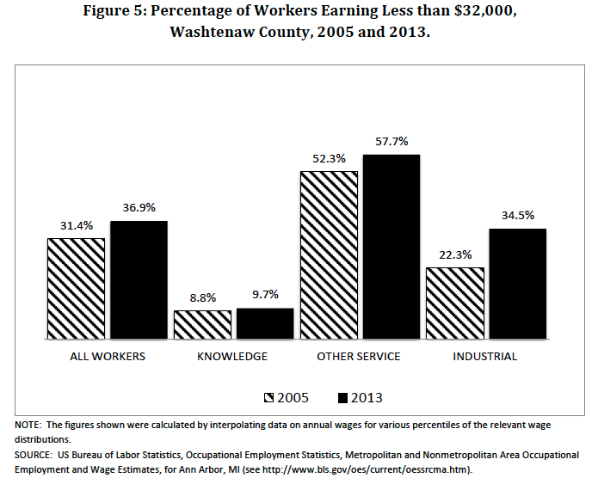 Conventional wisdom in the 21st Century says that the salvation of our economic future will come from the so-called “knowledge economy“, an economy based largely on technology and that sees education and knowledge as both a business product and a productive asset. In knowledge economies, the need for high-skill workers is amped up and these workers are, presumably, paid more because their skill sets are more desirable.
Conventional wisdom in the 21st Century says that the salvation of our economic future will come from the so-called “knowledge economy“, an economy based largely on technology and that sees education and knowledge as both a business product and a productive asset. In knowledge economies, the need for high-skill workers is amped up and these workers are, presumably, paid more because their skill sets are more desirable.
Few communities embody the concept of a knowledge economy as well as Washtenaw County in Michigan. Home of the University of Michigan in Ann Arbor and Eastern Michigan University in Ypsilanti, Washtenaw County is also the home base for a wide array of technology-focused companies. Here, one would assume, you will find a community that bucks the trend of the rest of the state, where the problem of income inequality would improving relative to places where manufacturing, service, or agriculture-based economies are more prevalent.
A new report released today by the University of Michigan-Dearborn Center for Labor and Community Studies proves that income inequality in a knowledge economy is still a critical problem, however. Using Washtenaw County as a case study, the researchers show that, while the number of jobs in Washtenaw County has grown since 2005, median wages have dropped and the number of residents living in poverty has grown over the same time period. You can read the report titled “Growing Together or Drifting Apart?” HERE.
Here are some of the key findings of the report:
- Wages became more unequal in Washtenaw County between 2005 and 2013.
As this chart from the report shows, the overall number of jobs in Washtenaw County has increased by 2% from 2005-2013, a period that straddles the Great Recession that heavily impacted our state. The chart also shows that jobs in the “knowledge” sector increased by 26%:
However, during that same time, the mean income, which takes into account the impact of inflation, has dropped for workers overall, including the knowledge sector. Industrial workers were the hardest hit, experiencing a 25% decrease in real wages:

- 37% of individual workers in Washtenaw County do not earn enough to meet basic family needs.
Despite having one of the most robust economies in the state of Michigan, over a third of Washtenaw residents earn less than $32,000 a year. According to the study, “This is less than a basic needs budget for the county as determined by the Michigan League for Public Policy (MLPP).” The number of workers in this situation increased for workers in all sectors discussed in the report:

- 24% of households in Washtenaw County do not earn enough to meet basic family needs.
- Nine of the ten largest job categories in Washtenaw County pay less than $32,000 per year.
- Nine of the ten job categories with the largest projected future employment growth also pay less than $32,000 per year.
Ian Robinson, president of the Huron Valley Central Labor Council (HVCLC) which represents 37 local unions in Washtenaw and Livingston Counties, is one of the authors of the study. He had this to say about what their research has revealed:
Jobs may be growing in Washtenaw County, but for far too many, income is not. One-third of workers in our county don’t earn enough to meet basic family needs. That’s a problem for all of us, because our local economy is driven by strong families and healthy consumer spending.
This study debunks the notion that reliance on a “knowledge economy” is the solution to income disparity in our state and in our country. The authors do not proscribe a solution to this problem in the study. However, the Huron Valley Central Labor Council has convened the Growing Together Task Force, which includes community, business, labor, and elected leaders, to address the challenge of growing income inequality and to develop appropriate policy responses.
Hopefully this study will help guide policy makers and legislators as they craft solutions address income disparity in the USA. If the solutions that are proposed are based on flawed assumptions, they are doomed to fail before they begin. It is clear from this work that the solutions must not be based solely on a shift to a knowledge economy since evidence shows that that approach will do little to improve the lives of those who do not earn enough to even support their families.
[Arrow image: FreeDigitalPhotos.net]



